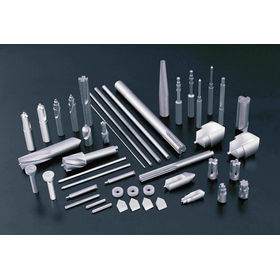Mold with a diameter of 0.18mm and a depth of 4mm.
At Tokyo Bolt and Screw Machine Co., Ltd., we handle "header molds for micro parts" made of carbide material. We can achieve hole diameters down to 0.15mm, and for hole diameters of 0.2mm or more, a depth of approximately 50 times is possible. Please feel free to contact us if you have any requests. 【Processing】 ■ Fine and deep hole processing by electrical discharge machining → Mirror finishing by lapping * For more details, please download the PDF or feel free to contact us.
Inquire About This Product
basic information
[Shaped Products] ■ Screws, rivets, lead pins, connector pins, contacts, etc. *For more details, please download the PDF or feel free to contact us.
Price range
Delivery Time
Applications/Examples of results
For more details, please download the PDF or feel free to contact us.
catalog(1)
Download All CatalogsCompany information
Tokyo Bolt and Nut Company has focused on the hidden potential of cemented carbide, refining technologies for machining irregular shapes, fine holes, deep holes, and lapping processes for cemented carbide. We were once a "mold manufacturer," but our goal is to be recognized by our customers as a "ultra-precision machining manufacturer." Recently, we have succeeded in mass-producing molds with direct engraving on cemented carbide, a world first! Cemented carbide is an extremely hard metal. Traditionally, machining cemented carbide required "very expensive special machining centers and special tools, making it possible to process only under certain conditions, resulting in high costs and limited shapes and precision. Therefore, it was common knowledge that machining cemented carbide was done through electrical discharge machining. We have conducted years of research with the goal of mass-producing cemented carbide molds at low cost, specifically aiming for direct engraving and omitting lapping. We have now achieved both. As a result, while maintaining quality equal to or better than traditional methods, we have achieved a running cost of less than one-fifth of the conventional method with 24-hour continuous operation. In the future, we will utilize this technology to contribute to the miniaturization and lightweighting of parts in aerospace, precision machinery, and medical fields.

















![[Processing Reference Example] Casing Screw Machining](https://image.mono.ipros.com/public/product/image/2088546/IPROS16021466541096188662.png?w=280&h=280)